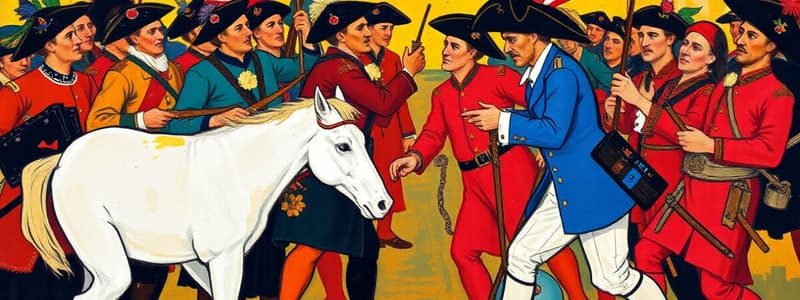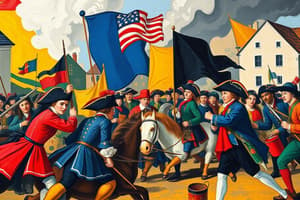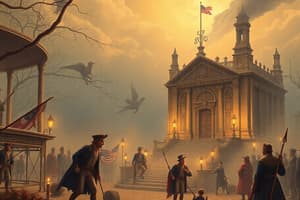Podcast
Questions and Answers
What was a major consequence of the French and Indian War for the colonists?
What was a major consequence of the French and Indian War for the colonists?
- The colonists were granted more autonomy by the British government.
- The colonists began trading more with France.
- The colonists gained more land in the Ohio River Valley.
- The colonists were forced to pay taxes to help pay for the war. (correct)
How did the colonists react to the Stamp Act?
How did the colonists react to the Stamp Act?
- They began trading more with other European nations.
- They started a war against the British to fight for independence.
- They peacefully petitioned the British government to repeal the act.
- They organized boycotts of British goods, refusing to purchase them. (correct)
What was the main purpose of the Sons of Liberty?
What was the main purpose of the Sons of Liberty?
- To establish a separate colonial government independent of British rule.
- To organize protests and rallies against British policies. (correct)
- To maintain order and security in colonial towns.
- To provide legal defense for colonists accused of crimes.
Which of these was NOT a direct result of the Boston Tea Party?
Which of these was NOT a direct result of the Boston Tea Party?
What was the significance of the Quartering Act for colonists?
What was the significance of the Quartering Act for colonists?
What was the main objective of the French and Indian War?
What was the main objective of the French and Indian War?
What was the primary purpose of the Sugar Act?
What was the primary purpose of the Sugar Act?
The Tea Act was considered by the colonists to be unjust because:
The Tea Act was considered by the colonists to be unjust because:
What was the main issue that led to the Boston Massacre?
What was the main issue that led to the Boston Massacre?
Which of the following events involved colonists throwing tea into the harbor?
Which of the following events involved colonists throwing tea into the harbor?
Which of the following best describes the relationship between the Sons of Liberty and the British government?
Which of the following best describes the relationship between the Sons of Liberty and the British government?
What was the primary reason behind the colonists' opposition to the Quartering Act?
What was the primary reason behind the colonists' opposition to the Quartering Act?
What was the immediate consequence of the Boston Massacre?
What was the immediate consequence of the Boston Massacre?
What was the main purpose of the Administration of Justice Act?
What was the main purpose of the Administration of Justice Act?
Which of the following groups actively campaigned against British policies and taxes, often using violent tactics?
Which of the following groups actively campaigned against British policies and taxes, often using violent tactics?
Who was appointed to lead the Continental Army in the fight for American independence?
Who was appointed to lead the Continental Army in the fight for American independence?
What was the main goal of the Patriots during the American Revolution?
What was the main goal of the Patriots during the American Revolution?
Which event occurred in 1773?
Which event occurred in 1773?
Flashcards
Administration of Justice Act
Administration of Justice Act
Allowed British officials to be tried in England, limiting colonial justice.
Colony
Colony
A settlement ruled by another country.
Boycotting
Boycotting
Refusing to buy or use goods to protest.
Loyalists
Loyalists
Signup and view all the flashcards
Sons of Liberty
Sons of Liberty
Signup and view all the flashcards
Boston Massacre
Boston Massacre
Signup and view all the flashcards
Sugar Act
Sugar Act
Signup and view all the flashcards
Stamp Act
Stamp Act
Signup and view all the flashcards
Quartering Act
Quartering Act
Signup and view all the flashcards
Boston Tea Party
Boston Tea Party
Signup and view all the flashcards
Boycott
Boycott
Signup and view all the flashcards
Patriot
Patriot
Signup and view all the flashcards
George Washington
George Washington
Signup and view all the flashcards
French and Indian War
French and Indian War
Signup and view all the flashcards
Study Notes
Colonial America & The American Revolution - Study Notes
- Colony Definition: A settlement controlled by another country.
- Boycotting: Refusal to buy certain products or support a cause.
- Loyalist: Person who supported remaining loyal to the British King.
- Patriot: Person who wanted independence from British rule.
- Sons of Liberty: Colonists advocating for colonial rights; sometimes used forceful methods.
- George Washington: Commander of the Continental Army.
- French and Indian War Cause: Disagreement over the Ohio River Valley.
- Sugar Act Taxed: Sugar, coffee, and wine.
- Stamp Act Taxed: Documents (diplomas, contracts, newspapers).
- Townshend Act Taxed: Paper, paint, and tea.
- Boston Massacre: British soldiers fatally shot colonists.
- Boston Tea Party: Colonists protesting taxes by dumping tea into Boston Harbor.
- Quartering Act: Colonists required to provide housing for British soldiers.
- Massachusetts Government Act: Restricted colonial self-government.
- Administration of Justice Act: Allowed British officials to be tried in England.
- Loyalist vs. Patriot: Loyalists sought to stay British, Patriots sought independence.
- Sons of Liberty: Supported colonial rights through various means
- George Washington: American Revolution military leader (commander of Continental Army).
- French and Indian War (Focus): Land dispute in Ohio River Valley.
- Sugar Act (Focus): Taxed colonial imports like sugar and wine.
- Stamp Act (Focus): Imposed tax on documents and printed materials.
- Boston Massacre (Focus): British soldiers killed colonists.
- Boston Tea Party (Focus): Colonists protested taxes through a dramatic act.
- Quartering Act (Focus): Required colonists to house British soldiers.
- Massachusetts Government Act (Focus): Restricted colonial governance severely.
- Administration of Justice Act (Focus): Allowed British officials to be tried outside colonies.
- Boston Tea Party Year: 1773.
- Boston Massacre Year: 1770.
- King of England (Revolution): King George III.
- Patriot Goal: Independence from British rule.
- Loyalist Goal: Remain loyal to the British King.
- Acts and their targets:
- Sugar Act: Primarily on imported goods
- Stamp Act: Printed materials
- Townshend Act: Various goods like paper and lead
- Quartering Act: Housing troops
- Tea Act: Tea
- Intolerable Acts: Designed to punish colonists, covering many aspects of governance.
Studying That Suits You
Use AI to generate personalized quizzes and flashcards to suit your learning preferences.




